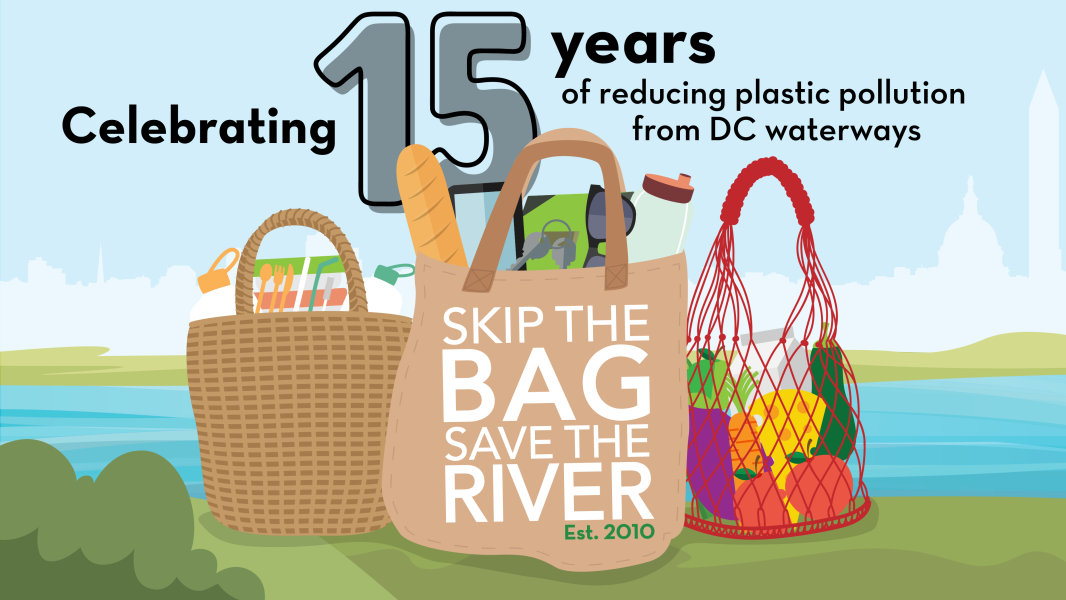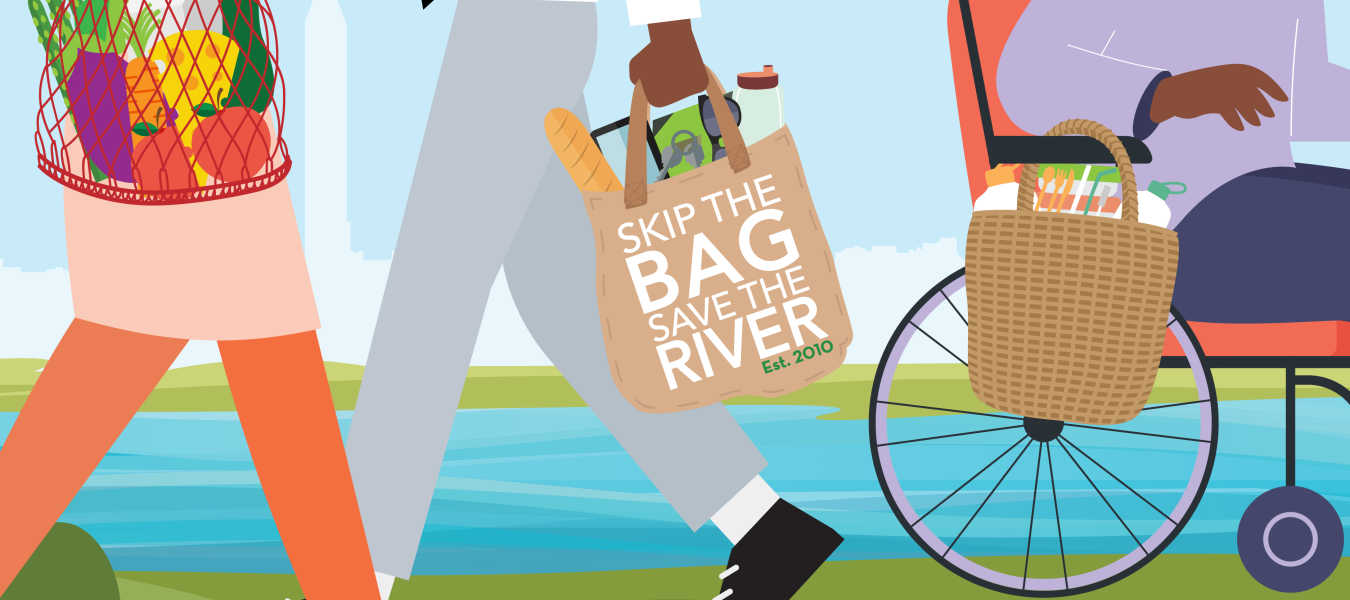
NEW: We have a newly designed Bag Law decal!
Print and display at your business to remind customers of the 5-cent fee for each carryout bag.
- Bag Law Decal (Vertical) - Bag Law Decal (Horizontal)
Want some reusable bags for your nonprofit organization?
Have questions or feedback on the Bag Law?
Would you like us to mail you some decals (subject to availability)?
Contact DOEE’s Compliance Assistance and Policy Team at [email protected].
Didn’t get charged the Bag Fee? Let us know through the tip form or 311.
In 2009, DC Council passed the Anacostia River Clean Up and Protection Act, commonly referred to as the Bag Law. The law went into effect on January 1, 2010. The law’s two main accomplishments were:
- Establishing a 5-cent fee (“Bag Fee”) for single-use carryout bags at certain retail and food-serving businesses.
- Creating a special-purpose revenue fund (“Bag Fund”) for projects that support a clean and healthy Anacostia watershed.
At the time, the District’s Bag Law was the first of its kind in the country. Since then, hundreds more cities, counties, and states have followed – some going as far as banning plastic bags entirely! Learn more about the Bag Law below, including requirements and how to comply and view the final regulations.
What is the purpose of the law? | What has the law’s impact been?
What do residents need to know? | What do businesses need to know?
What is the purpose of the law?
The purpose is to reduce the amount of single-use carryout bags – especially those made from plastic – that end up in the Anacostia River. The river flows through the District and experiences pollution from trash, toxins, sewage, and other environmental problems from its industrial and urbanized watershed. A 2008 study confirmed plastic bags as one of the river’s largest trash categories.
Plastic pollution is linked to numerous issues that impact the health of humans, wildlife, and the environment in our ecosystem. Learn more about the impact of trash and how to address the problem at Trash Free DC.
What has the law’s impact been?
The Bag Law led to a noticeable reduction in single-use carryout bags throughout the District. Six months after implementation, an initial survey found 75% of residents reduced their plastic bag usage since the law went into effect while a majority of businesses said their own bag consumption is at least 50% lower. A second survey in 2013 found 79% of residents are carrying reusable bags, 80% of residents are using fewer bags, and Districts households have reduced the number of disposable bags used by 60%.
In addition to keeping the river cleaner, the law has other environmental benefits, including reducing the harmful greenhouse gas emissions (GHGs) that lead to climate change. Plastic is made from fossil fuels and generates additional GHGs at every step of its life cycle.
Finally, the Bag Fund supports river cleanup and protection projects including trash capture, educational boat tours, environmental education programs, green infrastructure, and more. You can read about them in the Bag Law’s annual summary reports.
What do residents need to know?
Residents helped advocate for the Bag Law, and residents can continue to support it by:
- Bring reusable bags! Reusable bags can be found everywhere now and come in all shapes and sizes. They are easy to store in your car, bike or laptop bag, backpack, or even foldable ones for your purse or pocket – and you avoid paying the fee.
- Always pay for bags at self-checkouts. With the increase in self-checkout stations, customers must do their part to self-report disposable bag usage.
- Help with compliance by leaving a tip. If you were not charged the Bag Fee but should have been, let us know through the tip form or 311.
In addition to the Bag Fee, the Bag Fund receives revenue from two sources that District residents can choose to support.
- Voluntary tax contributions. If you pay income taxes in the District, you can contribute to the fund through your tax return. Learn more from the DC Office of Tax and Revenue.
- Commemorative license plate. The District government offers a specialty vehicle tag to support the fund. Learn more from the DC Department of Motor Vehicles.
What do businesses need to know?
Cooperation from District businesses is key to the success of the law. Some reminders for retailers, restaurants, and other businesses to stay in compliance:
- Charge 5 cents per bag, no more no less. Each disposable carryout bag is a 5-cent charge per bag and must be listed on the receipt. If a store charges its own fee for bags, the District fee must be a separate line item.
- Charge twice for double bags. The 5-cent charge is for each disposable bag provided, including when double-bagging – but do not double-bag unless needed!
- Charge for online order bags. Retailers and restaurants must charge for bags used to fulfill online orders for groceries and meals, including third-party delivery app orders.
- Monitor self-checkouts. Only provide bags to those who pay for them.
- Remember to remit. Businesses must remit 4 of every 5 cents collected to the Office of Tax and Revenue. This is done as the “Disposable Carryout Bag Fee” line item on your business Sales and Use tax return forms, generally completed online through the MyTax.dc.gov portal either monthly, quarterly, or annually. View instructions for bulk upload or online entry for tax year 2024.
Don’t get caught! DOEE has a team that regularly inspects businesses for compliance, and the Office of Tax and Revenue audits businesses for compliance with fee remittance. DOEE receives tips from the public and inspects those businesses. Fines may be issued for noncompliance.
What are the exemptions to the law?
Businesses do not have to charge the fee for disposable or single-use bags given for these purposes:
- Bags to package bulk items, such as fruits, vegetables, nuts, grains
- Bags to wrap frozen foods, meat, or fish to prevent contamination
- Bags to contain or wrap flowers, potted plants, or other items where dampness may be a problem
- Bags to contain unwrapped prepared foods or bakery goods
- Bags distributed by a pharmacist to contain prescription drugs
- Newspaper bags, door-hanger bags, laundry-dry cleaning bags, or bags sold in a package intended for use as garbage, pet waste, or yard waste bags
- Bags for transporting partially-consumed bottles of wine
- Paper bags given to customers at restaurants and other food-serving businesses that have on-site dining facilities
Do restaurants have to charge the fee for bagged orders?
Yes, as businesses that sell food and/or alcohol to the general public, restaurants have to charge and remit the fee for in-person, phone, and online orders, including those done with third-party delivery apps.
There is an exemption for restaurants and other food-serving businesses if they have on-site seating and they distribute paper bags; if both of these apply, no fee needs to be charged. Plastic bags, however, must always be charged for.
I have more questions. Who can I contact?
We are here to help! Please contact DOEE’s Compliance Assistance & Policy Team at [email protected] for more questions.


